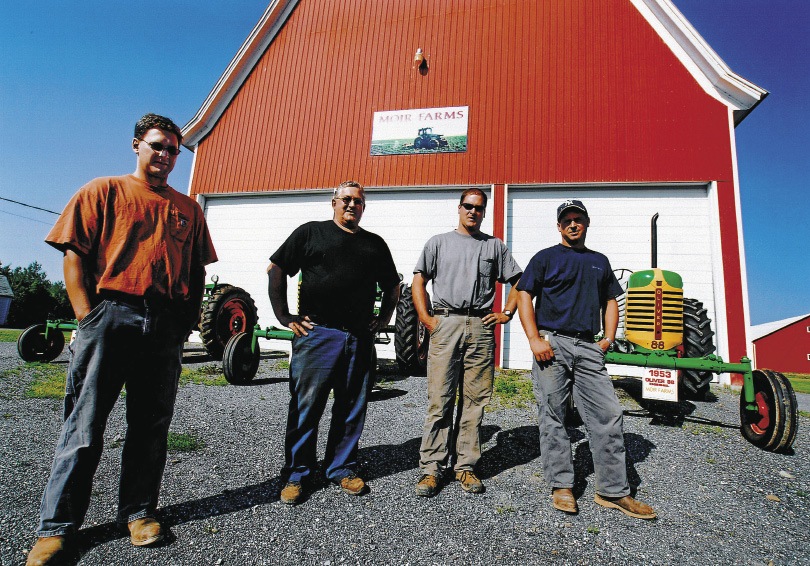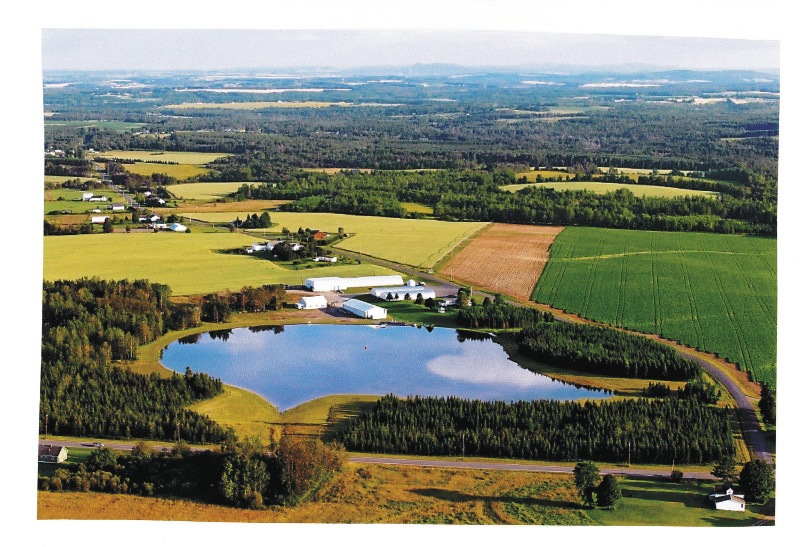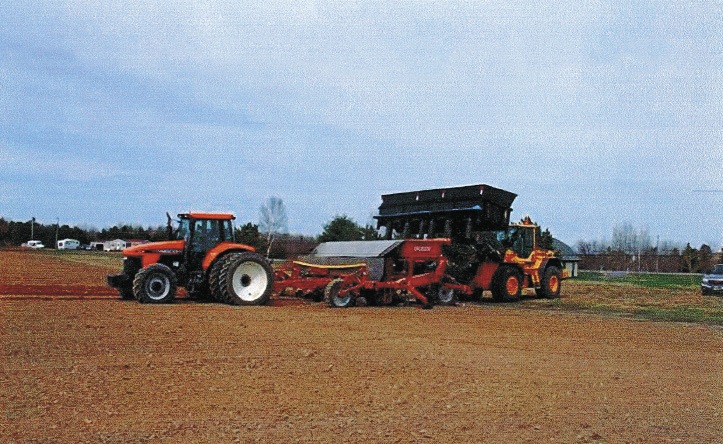
Alan Moir has been a Maine potato grower for 20 years now, and for four of those past 20 years, he has represented his home state as a United States Potato Board (USPB) board member. He farms with his father, Ronald, and his brothers Jason and Scott, on their farm near Woodland, Maine.
Moir Farms produces mostly Russet Burbank for McCain Foods, Ltd., along with some Innovator Russet and Highland Russet for processing. Russets are produced for Pineland Farms Naturally Potatoes, a Maine potato innovations company producing refrigerated mashed, french fries and diced potato products for both retail and foodservice. Andover, a round-white early-chipping variety, is also grown for Frito-Lay and Cape Cod Chips.
Broccoli and oats are the rotation crops at Moir Farms.
Moir is a USPB Administrative Committee Member currently serving on the USPB Industry Communications and Policy Committee. He works with fellow committee members from across the United States, leading the USPB's industry and grower communications and outreach programs as well as the policy development and implementation programs for the USPB. He previously served two years on the USPB Finance Committee, enabling the USPB's potato demand building, market development mission, by helping approve and implement budgets for the USPB's 2010 and 2011 fiscal years.
Prior to becoming a USPB board member, Moir was already an active leader in his state's potato industry. He served two years as president of the Maine potato industry's Agricultural Bargaining Council (ABC), and was also previously a vice president and a treasurer for this organization. ABC is a board made up of growers who work with area processors like McCain Foods and Naturally Potatoes to negotiate production contracts. They hold quarterly meetings to manage changes and issues relating to grower contracts. ABC reviews base contracts, the language, money, incentives and conditions of contracts. Moir has been part of the negotiating team for ABC and Naturally Potatoes for the past six years.
In 2008, Moir received Maine's Young Farmer of the Year award, in recognition of his efforts to embrace technology to improve his family's farm and stewardship over the land. This same year, he was part of the Potato Industry Leadership Institute (PILI), a two-week "immersion-like" program providing an overview of the potato industry's challenges and issues beyond the production sector, and the roles of the industry's state and national organizations in maintaining a positive business climate for potato growers. PILI is a joint venture of the National Potato Council and the USPB and is sponsored by Syngenta Crop Protection. Moir is also a member and past president of the Aroostook Young Farmers Association.
Lifelong Grower
Like many people growing up on potato farms in Maine, Moir recalls his early years when potato production was less mechanized, requiring the labor of many field hands to help bring in crops each year.
 "Working on the farm during those first childhood years, I remember going out to the fields with my sister, and working on hand crews and pickers," he says. "It wasn't until later we purchased our first conventional harvester.
"Working on the farm during those first childhood years, I remember going out to the fields with my sister, and working on hand crews and pickers," he says. "It wasn't until later we purchased our first conventional harvester.
So in my lifetime, I've personally experienced the transition from hand labor to mechanization."
From this beginning, Moir later attended college at Northern Maine Community College, and graduated with an associate's degree in business administration. He later participated in the Business of Potatoes held at Purdue University, and sponsored by Syngenta.
"From start to finish, my motivation is potato production," Moir said. "I just really like getting out and working the fields in the spring, putting the seed in the ground, watching everything growing during the summer; and then later, when it turns fall, reaping the rewards of hard work and dedicated stewardship to the land.
"You never quite know how the year, the seasons or your efforts will affect your crop's quality or what you will get from the harvest. So it's with a high level of anticipation, and some anxiety, we head out to the fields, and the answers to all of those lingering, season long questions roll in with each successive truckload, and with the conclusion of each day."
State, National Partnerships
As a state and national leader, Moir has a unique perspective of how the state and national organizations augment the roles, programs and missions of the U.S. potato industry. There are about 380 growers in the Maine potato industry. The need for industry collaboration to preserve and create opportunities is increasingly recognized. Sustainment for the business and livelihoods of Maine's present and future growers is top of mind.
"Before the Maine Potato Board asked me to represent Maine on the USPB, they gave me a brief overview of the Domestic and International Marketing committees, and explained how I would have the opportunity to participate in different aspects of market development for the national potato industry," Moir says. "During my four years on the USPB, I've gained an appreciation of the scope and breadth of the USPB's work. There are a great number of people involved, and it's amazing to see the progress this organization is making with regard to increasing exports, consumer research and making sure the industry is aware through outreach and support.
 "During my PILI experience, it was amazing to meet with a panel of consumers and to learn how little they knew about potatoes and nutrition. Those of us involved with food production know and understand this, but the USPB has its work cut out, and it's been great since that time about five years ago to see the strides that have been taken with advertising and social media campaigns.
"During my PILI experience, it was amazing to meet with a panel of consumers and to learn how little they knew about potatoes and nutrition. Those of us involved with food production know and understand this, but the USPB has its work cut out, and it's been great since that time about five years ago to see the strides that have been taken with advertising and social media campaigns.
"I'm also pleased with the efforts the Maine Potato Board is making to reach consumers, too. They've developed their own new consumer website, www.saypotato.com, and have you seen our Maine Potato Board `Dance Video'? It's pretty catchy and helps spread the love for Maine potatoes."
The Maine potato industry consists of roughly 7,000 acres of fresh potatoes and 37,000 chip and processing potato acres, with the bulk of this going to McCain Foods and Frito-Lay and 11,000 acres for seed production. Maine has an excellent reputation for high-quality, low-virus seed and serves markets all along the east coast clear to Florida.
Growers like Moir help make Maine the great potato state that it is. His leadership and representation on the USPB continues to benefit both the state and national industry and maximizes return on grower investment.